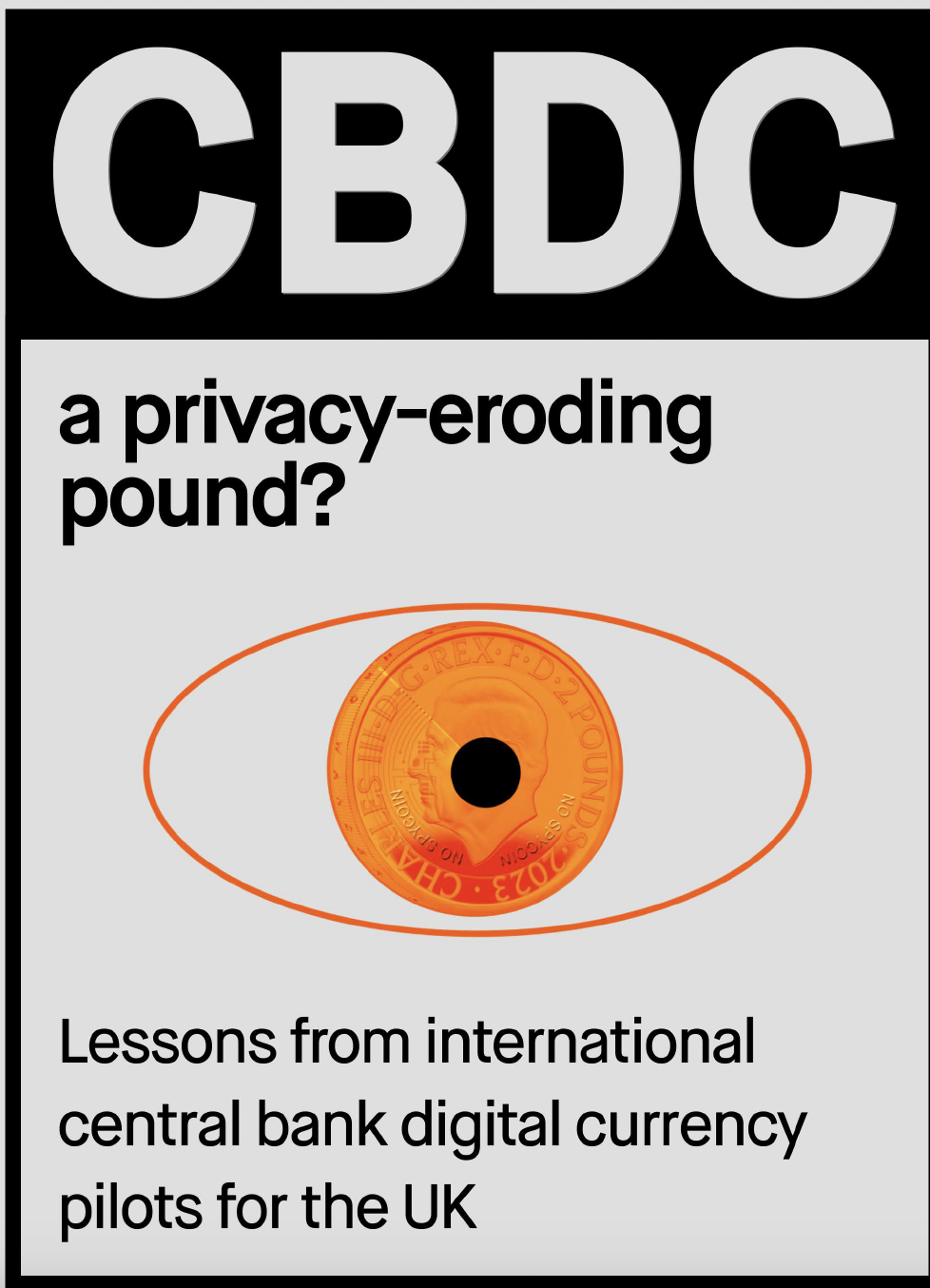
CBDCs are “a disaster for privacy”: The Government Must Listen To Warnings From Around The World And Rethink The Digital Pound
Warnings from around the world show that a digital pound will facilitate financial surveillance, exacerbate financial exclusion and that it remains a solution in search of a problem according to a new report by civil liberties campaign group Big Brother Watch. The report, titled CBDC – A privacy eroding pound, includes in-depth analysis of seven major trials of digital currencies, finding that no central bank digital currency offers privacy protections on a par with cash.
The report takes a detailed look at several CBDC projects around the world, from different regions, economic models and stages and examines their design to see how digital currencies impact human rights – and considers what lessons the UK should learn from them.
Key conclusions from each case study:
- Sweden, e-krona: Even when there is some emphasis on privacy, transactions will be traceable by the authorities
- Israel, digital shekel: The central bank admits “absolute privacy will not be possible” and the digital currency will support government policy to reduce cash use in Israel.
- Jamaica, Jam-Dex: CBDC wallets will be tied to biometric IDs, and there are plans to issue welfare payments via Jam-Dex
- Eurozone, digital euro: transaction data would be monitored by the European Central Bank
- China, digital yuan: CBDCs are being used to nudge individuals’ behaviour
- Nigeria eNaira: Tough ID requirements are needed to access a useful wallet, while uptake has been low despite a hard currency crisis
- Uruguay ePeso: Trials found that women and older people were less likely to use digital currency.
Big Brother Watch is calling on the Government to go back to the drawing board and consider more deeply the significant privacy issues associated with plans for a UK digital pound. Analysis of the UK proposals suggests that a so-called Britcoin would be radically less private than cash, would likely require a link to digital identity information, and be associated with serious privacy and equality risks.
Israel and the European Central Bank have taken tentative steps to examine how private transactions could be conducted with a CBDC. However both banks remain clear that this would be subject to strict restrictions, meaning most transactions could be monitored – and the limited carve-outs would not address privacy concerns.
Some of the most worrying findings from international CBDC projects included outright rejection of privacy rights, admissions that every transaction can be traced, links to welfare payments and tax collections, and the connection of wallets to biometric ID systems. Across the board, the projects analysed were largely unsuccessful and uptake was low in most cases. The pilots also demonstrated that CBDCs are not a solution to the complex causes of financial exclusion but can make this problem worse. Each of these concerning points is a lesson that the Treasury and Bank of England must take on board as they examine a potential digital pound.
Big Brother Watch has laid out key principles that any proposals for a future digital pound must reflect to have a chance of meeting data protection and human rights standards:
- Any exploration of a CBDC should maximise user privacy by design – for example, a token-based rather than account-based architecture based on a distributed rather than centralised ledger.
- User data must be safeguarded in law, and individuals must be able to freely choose whether or not to use a CBDC.
- User data must not be shared without meaningful, informed and freely given consent.
- Decisions over whether to proceed with a new CBDC must meaningfully engage the public and lawmakers, and not remain within the remit of the central bank.
- Financial inclusion must be meaningful and a CBDC introduction must not be done in detriment to the cash economy, which must be protected
- Programmability functions must be prohibited by law.
Susannah Copson, Legal and Policy Officer at Big Brother Watch said:
“Our extensive research shows that wherever they have been piloted, Central Bank Digital Currencies have been a disaster for privacy. CBDC projects around the world have painted a consistent picture of low uptake and poor outcomes, paired with real threats to human rights and civil liberties.
“Just as has been the case for international CBDC projects, the UK Government is yet to show why we need UK CBDC – particularly given the series of risks to fundamental rights and freedoms. It is vital that the Government now take notice of the many problems international CBDC pilots have encountered and rethink their current plans for a centralised digital pound.”
ENDS.
Notes:
Spokespeople are available for interviews. Contact Big Brother Watch’s 24h media line on 07730439257 or email info@bigbrotherwatch.org.uk
You can find a copy of the report here.
You can find more information on Big Brother Watch’s work on central bank digital currencies here.
